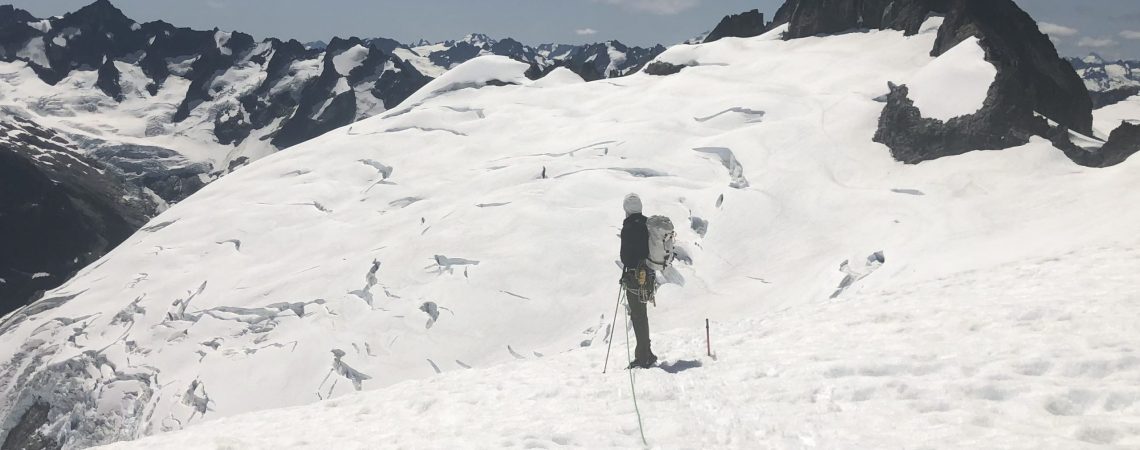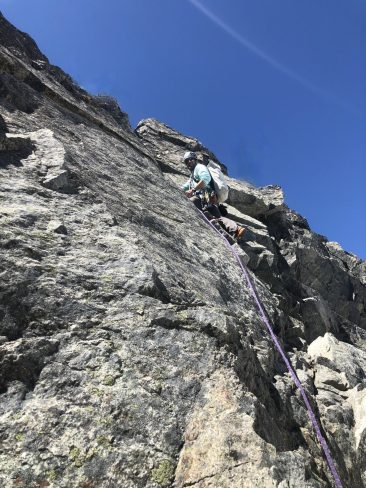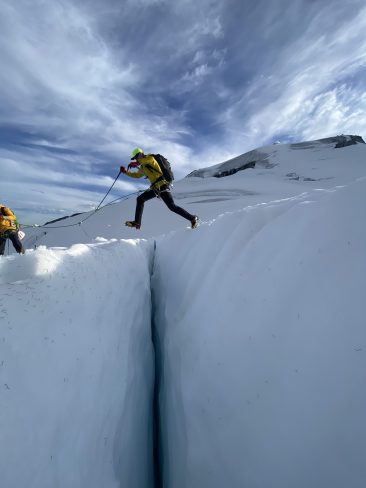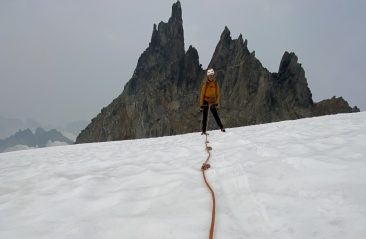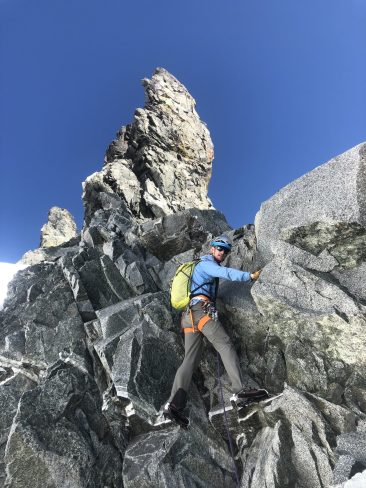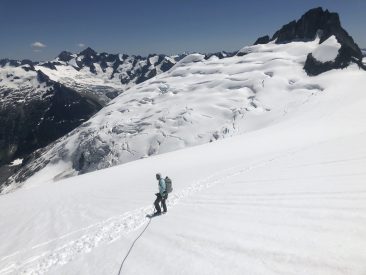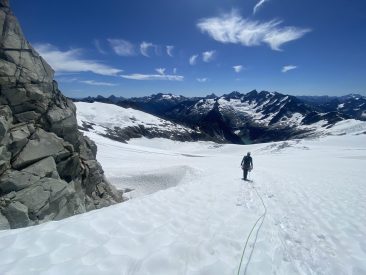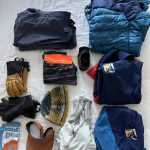Climbing the Chockstone Route on Austera Peak offers a wild and rewarding alpine adventure deep in the remote reaches of the North Cascades. This route weaves through a rugged and rarely traveled landscape, where climbers can make a scenic loop from high camp by crossing several distinct glaciers—including the Klawatti, North Klawatti Glacier, McAllister, and Inspiration Glaciers—during the summit push. The route itself features moderate climbing with stunning views, and the area is surrounded by enticing opportunities to tag nearby peaks like Deans Spire, Banada Spire, Eldorado Peak, Klawatti peak, various Tehpe Towers, or even Dorado Needle, making it an ideal objective for adventurous mountaineers seeking solitude, variety, and a true sense of wilderness exploration.
- Dates: Custom, call or email for availability
- Duration: 3-days (Available as a 4-day combined with Eldorado Peak and/or other peak bagging opportunities)
- Level: Intermediate to Advanced
- Client Ratio: 3:1
- Difficulty: II 5.2 (2-3pitches)
- Cost:
- 1:1 $1,800 per person
- 2:1 $1,200 per person
- 3:1 $ 990 per person
- Included: Park fees, group climbing equipment, and guide services.
- Not Included:Ground transportation airfare, transportation within Seattle, hotel accommodations, restaurant meals, gratuities for guides, meals while on the mountain, and all personal items
Day 1 – 6,000′ ↑, 7~ Miles, 6-8 hours: Start at the Cascade River Road trailhead and hike approximately 7 miles with about 6,000 feet of elevation gain to reach the East Ridge of Eldorado high camp near the Eldorado Ice Cap. The approach involves forested trails, steep talus, and glacier travel as you gain altitude, culminating in a stunning alpine camp nestled in a very alpine setting with spectacular views of surrounding peaks and glaciers.
Day 2 – 1,550′ ↑ 1,550′↓, 3.5 ~ Miles, 5-7 hours: From camp, rope up early and cross the Inspiration, McAllister, and Klawatii Glaciers before wrapping up to the base of the rock tower of Austera. Enjoy solid 2-3 pitches of very moderate rock scrambling to the base of the infamous chockstone chimney. Climb the infamous Chimney (5.2 and around 60ft long) to the summit of one of the more scenic peaks in the Cascades. After enjoying the summit rappel the route and either reverse the approach back to your high camp or cross several more glaciers completing a large loop and a day of memorable climbing in a remote and pristine setting.
Day 3– 6,000′↓, 7~ Miles, 5-6 hours: Break camp and retrace your steps back down the approach route to the Cascade River Road trailhead, covering roughly 7 miles and descending 4,500 feet. This return offers time to reflect on the adventure amid stunning North Cascades scenery.
Optional Day 4: For those looking to extend the trip, climb Eldorado Peak via its classic East Ridge or the airy North Ridge, both offering spectacular views and additional alpine climbing challenges before descending back to camp or hiking out.
- Adjustable Trekking Poles
- Alpine Climbing boots Full shank crampon compatible leather, synthetic, or hybrid boot depending on climb and season.Single-weight synthetic/leather mountaineering boots are adequate for mid and late-summer climbs on Mount Baker and in the North Cascades when conditions are expected to be dry.
- Approach shoes after mid-July
- Alpine climbing harness Must have adjustable leg loops and fit over all clothing and can be put on with ski boots
- Ice Axe – Lightweight (50–70 cm)
- Crampons with anti-ball plate Must be fit to boots prior to trip,
- Climbing helmet Adjustable, should fit with hat on
- Belay Device
- 4 locking carabiners – 2 Large, pear-shaped carabiner is best, screw gate type recommended and 2 smaller locking screwgate
- 4 regular carabiners (e.g. small wire gate are recommended)
- 1 double length sling
- 1 single length sling
- 1 Cordelette 6 mil 18-20’(6-7 meters)
- 1 12” Prussik or Hollow Block*
Upper Body
-
- Lightweight base layer T-shirt or long sleeve polypropylene shirt
- 2 synthetic sports bras*(WOMEN)
- 1 long sleeve Sun Hoodie Lightweight, light colored for sunny days
- Soft Shell
- 1 Down/synthetic jacket with hood
- 1 Hard shell jacket with hood Waterproof and breathable. roomy enough to fit over multiple layers.
- 1 pair liner gloves Thin wool or polypropylene
- Shell gloves or mitts
- Warm hat Wool or synthetic
- Balaclava or Buff
- Shade hat or baseball cap
Lower Body
- 2 heavy wool/synthetic socks Check boot fit with liner and wool socks on
- 1 pair lightweight long underwear Polypropylene or Capilene
- 1-2 pairs of underwear boxers/briefs
- Soft shell pants
- Shell pants Waterproof/breathable with full side zips
Sleeping Gear
- Sleeping bag Rated to at least 20º F. Line the stuff sack w/ plastic bag.
- Sleeping pad 1 closed cell foam and/or Neo-Air for extra warmth and comfort.
Backpack
- 40-50 liter capacity
Miscellaneous Equipment
- Sunglasses 100% UV protection with side shields or wrap around.
- Personal first aid repair kit Basics: moleskin/blister kit, Band-Aids, first-aid tape, ibuprofen, personal medications, and batteries etc.
- Lip balm At least SPF 20
- Sunscreen At least SPF 40
- Headlamp lightweight LED
- 2 water bottles 1 liter wide-mouth Nalgene and 1 bottle holster, or
- Hydration bladder With drinking tube and 1 Nalgene bottle
- Bowl and spoon Plastic, small Tupperware works well. Lexan spoons are best.
- Toiletry kit Be sure to include WAG Bag or toilet paper stored in a plastic bag.
- Bandana
- Hand wipes
- Favorite snack foods (no more than 2 pounds)
WHO WILL MY GUIDE (OR GUIDES) BE?
We are small company who enjoy working together in the mountains as well as highly skilled professionals who hold current Wilderness First Responder certification and are proficient in technical rescue and evacuation skills. Our guides are dedicated to the world of alpinism, many having first ascents and hold professional certifications with the AMGA in the rock, alpine, and ski disciplines. The AMGA is part of the IFMGA, which is the international body of certified mountain guides.
HOW MUCH SHOULD I TIP MY GUIDES?
Tipping is considered standard practice in the guiding industry. Tipping amounts vary – so $20-30 per day per person/per guide is average that works well for the guides without a serious blow to your wallet. Often 10% of the course cost is a good rule-of-thumb. If you feel that the program was exceptional or substandard the tip can reflect that.
CAN I RENT EQUIPMENT FROM BCAG?
No, for these trips we strongly suggest to buy your equipment due to obscenely large rental costs for trip of this length.
HOW HEAVY WILL MY PACK BE?
Day trips will keep your pack between 10-15 pounds max.
WHEN DO I NEED TO PAY THE BALANCE OF MY TRIP?
For Scheduled Domestic Courses and Climbs: Your balance is due 60 days from trip departure. Payable by check, Credit Card with service charge or Venmo.
WHAT HAPPENS IF I NEED TO CANCEL MY TRIP?
If you should decide to cancel your trip, BCAG must be notified in writing. Your trip will be cancelled from the date we receive written notice. You will be assessed a cancellation fee according to the following schedule:
90 to 31 days from trip departure – 50% of trip cost
30 days or less – 100% of trip cost
WHAT HAPPENS IF BC ADVENTURE GUIDES HAS TO CANCEL MY TRIP?
In the rare circumstance where we need to cancel a program you can reschedule without a fee or receive a refund on your deposit. If circumstances arise that force us to cancel a program that is already in progress, we reserve the right to decide whether a refund or credit, at a prorated rate, will be issued. We are not responsible for cancellation fees or costs arising from your changed or cancelled flights, lodging, or other arrangements. We strongly recommend obtaining trip cancellation insurance from your travel agent.


